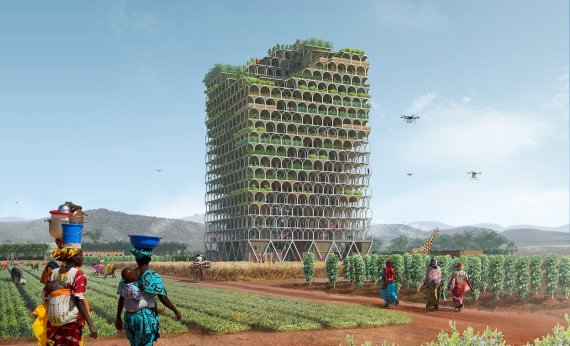This illustration on the cover of Wigboldus’s thesis on the upscaling of innovations contrasts small-scale African farming with vertical modern farming, © Paweł Lipiński en Mateusz FrankowskiSolutions to the world’s problems are usually sought in technology. Innovations are welcomed with open arms and rolled out on a large scale as quickly as possible, all in the interests of progress. But is that really so smart? No, says rural sociologist Seerp Wigboldus. In his thesis, To scale or not to scale – that is not the only question, which he will defend on 11 September, he seriously questions this approach. Famine Examples abound. Plastic packaging material was a fantastic invention. But it has now caused massive pollution all over the world. ‘Irrigating farmland in the Soviet Union led to the total draining of the Aral Sea. The concentration on potatoes in Ireland led to the potato blight, famine and poverty.’ Vulnerability is often a result of scaling up, says Wigboldus.
Irrigation in the Soviet Union led to the draining of the Aral Sea
‘Scaling up one thing often happens as the expense of something else. Another crop, for example. And also at the expense of biodiversity, the environment or the social structure in a community.’ As a case study in his thesis, Wigboldus studied rubber cultivation in south-western China, which started after World War II in order to reduce dependence on foreign imports.
‘That rubber was a success and small farmers made a fortune. But its impact on nature was huge. One third of the landscape was taken over by rubber plantations. The local climate, biodiversity and the ecology were totally disrupted. And the community was damaged as the increased wealth led to an erosion of cultural values and norms, in which the landscape and community were central.’
Anticipate
So how should it be done? Wigboldus has coined a phrase for it: responsible scaling. The key word is anticipate. ‘Ask yourself what will happen if something new is applied on a large scale. Calculate the effects: not just the economic effects but also the ecological, cultural and social consequences. And carry on monitoring effects. Some things cannot be anticipated, but you can build in mechanisms for noticing those unintended effects.’
The cover of Wigboldus’s thesis contrasts in a single image horizontal, small-scale African farming with vertical modern western farming in a tower block. ‘In English, to scale means not just increasing size or scope, but also to climb. That tower stands for both climbing and scaling up, and the question of whether that is really the way to tackle the world’s problems.’

